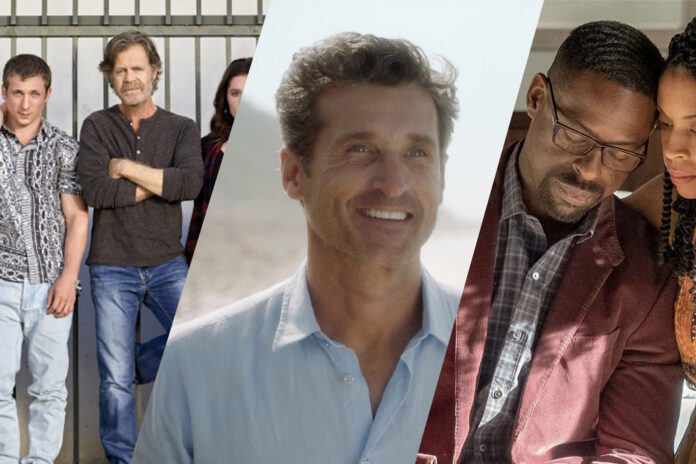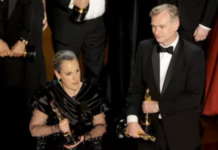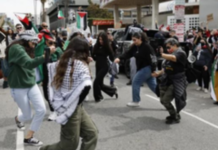By Khalida Sarwari
News at Northeastern
It’s been said that there’s no going back to “normal” after the pandemic ends, and in some ways, that is also likely to be true for the film and television industries, says Bobette Buster, a professor of the practice of digital storytelling at Northeastern.
While the health crisis has forced studios to pause production, screenwriters have used the time to think about crafting engaging stories set in the era of COVID-19 and the racial injustice protests sparked by the killing of George Floyd. And in the not-too-distant future when Tinseltown starts churning out movies and shows again, Buster says, audiences will be treated to “a glut” of quality content.
The pandemic has prompted producers and movie studios to consider how to safely reopen film and TV sets, where large crews commonly work in cramped spaces, and physical distancing is impossible between makeup artists and actors who must interact on set. Adaptation has been costly, but necessary, says Buster.“I believe we’ll have a golden era of storytelling, because you always do after a crisis; you always have remarkable stories that come out,” she says. “But how long it will take to actually go into production because there will be limited resources, that’s the big question.”

Several major productions have already been forced to shut down because producers were unable to obtain production insurance to cover a potential COVID-19 outbreak.
The shutdown has taken a severe financial toll across the industry, with closures pushing some movie theaters to the brink of bankruptcy, she says. It has also changed the public’s viewing habits. For the first time in history, China’s movie ticket sales surpassed North America’s.
“That is shocking that that would ever collapse as quickly as it did,” Buster says.
Despite these challenges, some studios say they’re pushing ahead with production schedules and plans to incorporate the pandemic into their storylines. One of the first films to address COVID-19 was Jay Roach’s Coastal Elites, which premiered on HBO in September. The film, filmed entirely over Zoom, portrays five people living in New York City and Los Angeles performing monologues about life before and during quarantine.
Three series, all written, filmed, and airing this year, took on the global health crisis in real time. Love in the Time of Corona, a four-episode romantic comedy by Joanna Johnson, tackles COVID-19 through stories centered on relationship bubbles between best friends, a rocky marriage, and a couple separated by illness.
Set against the backdrop of the pandemic, Martin Gero and Brendan Gall’s Connecting follows the lives of a group of friends who are trying to stay connected during a global pandemic.
Social Distance, created by Hilary Weisman Graham, is an eight-part series set during the beginning months of the pandemic and focuses on how families, friends, and couples were forced to cope with the effects of quarantine as well as the Black Lives Matter protests.
The NBC hit This Is Us addressed the pandemic in its present-day timeline. The creator of the Showtime series Shameless has said that he rewrote the final season of his show to address the coronavirus crisis and its economic effects. And Grey’s Anatomy executive producer Krista Vernoff has said that her show will tackle COVID-19 once it returns.
Viewers likely will be clamoring for this content, Buster says, recalling how many people were re-watching Steven Soderbergh’s 2011 thriller “Contagion” back in March. The film, about the global spread of a respiratory virus that originated in Asia, shares an uncanny similarity to our current reality.
“People always hunger for context,” explains Buster. “They want to understand the issues of our times.”
This desire to understand the bigger picture is why we have innumerable films about war, she says. The coronavirus crisis bears many thematic elements commonly found in great storytelling—for example, our longing for strong leadership to get us out of a major crisis is a theme in films such as Lord of the Rings and Star Wars.
“Those are actually stories about a small band of people who are trying to bring leadership and righteousness to a world where it’s become dominated by might,” Buster says. “And this is the same story we’re in the middle of today.”
But telling this story properly will inevitably require a perspective that only time can bring, she says.
In the more immediate future, she says, we’ll see how drama and comedy series tackle COVID-19. Still, she says, the way screenwriters and filmmakers handle the crisis is yet to be seen. Will they show characters wearing masks? Will they work social distancing into the plot? At least one show—ABC’s The Connors—is already there.
Will they incorporate the issue of systemic racism, and create great love stories set in the dueling crises? Or make gripping thrillers that work within today’s realities—or ignore them? Buster predicts Hollywood will be grappling with these questions for some time to come.
“This is really forcing writers to consider BIPOC (Black, Indigenous and people of color) issues, and diversity, and writing to that,” she says. “Whereas before everybody was always under these huge deadline pressures to get a series done, now they have the time to discuss: How are we going to create different storylines and create more interesting characters?”
(Reprinted with permission from the News at Northeastern.)














